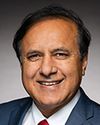Thank you, Mr. Seeback.
I would add that, from my perspective, we do have to suss out the public-facing element of what IRCC is telling the public and putting out, like “We're not going to automate refusals; we're not going to do any of these things” versus what's going on behind the scenes via the policy playbook, which I included as part of my brief.
Internally, I think IRCC is looking to automate refusals, is looking to try to remove humans, to have no human in the loop. For me, the concerning aspect is that until we put Chinook on the table and have proper independent consultations, though possibly a commission or ombudsperson, these will be ingrained into artificial intelligence and into algorithms that then become impenetrable, and especially when you litigate and especially when we do all these tools.
If we don't have the back data, we are unable to actually pursue those processes. Therefore, I second what Lou said, and I believe this data needs to be put on the table.
It doesn't have to be public. It can be private, in a secure setting, but it needs to be put on the table in order for us to decide the next path forward with Chinook and the future replacement.
Thank you.




